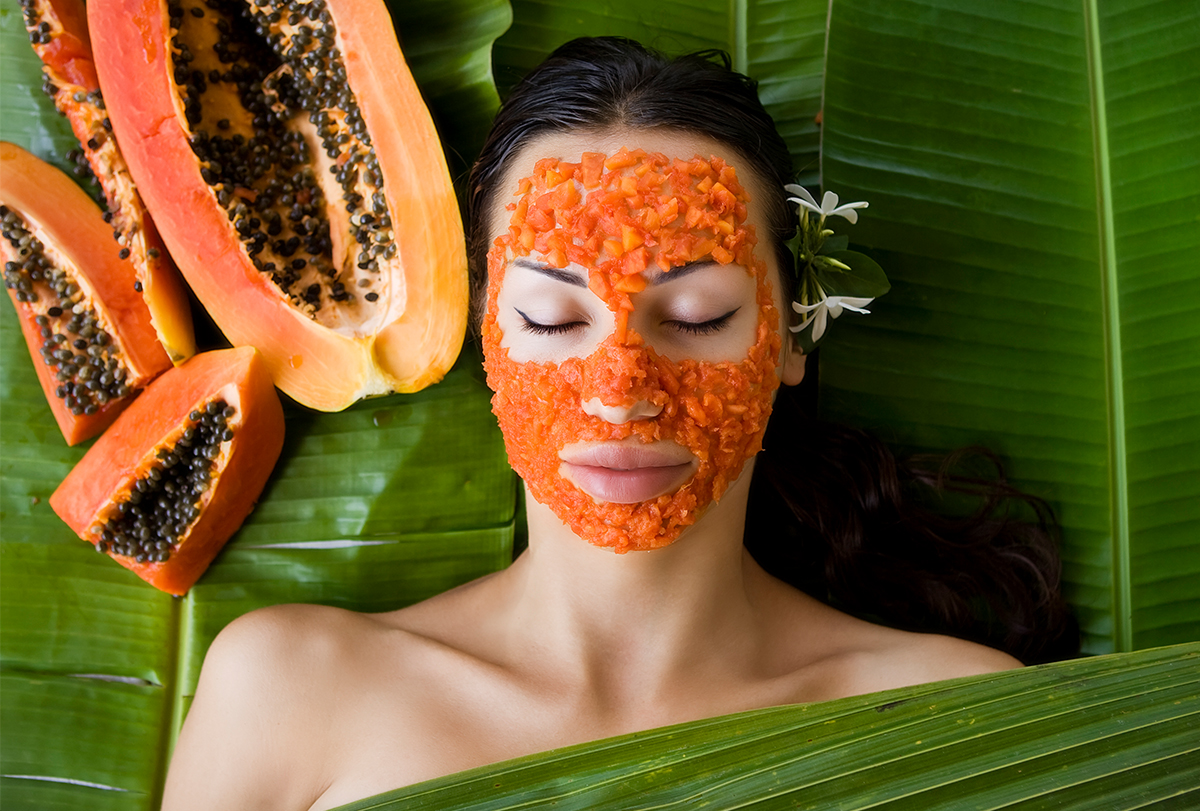In this article:
Papaya, formally an exotic fruit, can now be found worldwide throughout the year. It is a brightly colored sweet-tasting fruit with a soft, buttery, and musky pulp.

Besides being popular for its taste, papaya also offers various nutrients, including vitamin C, flavonoids, carotenes, minerals, B vitamins, and fibers. It also has antioxidant properties.
Papaya poses various benefits to your skin and is therefore widely used for dermatological purposes, commonly in the form of a face mask.
Know Your Ingredients

While papaya can in itself act as an efficient face mask, the following ingredients can help increase the benefits of a papaya face mask:
1. Honey
Honey possesses antimicrobial, wound-healing, UV protection, and moisturizing properties that can greatly benefit your skin. (1) It is best to select raw or organic honey for your face masks. In general, the darker the honey, the more beneficial it is.
2. Lemon
Lemon has a high content of vitamin C that helps prevent UV damage, promotes collagen production, and strengthens the skin. It also helps manage redness and inflammation caused by sun exposure. (2)
3. Milk
Milk is a natural moisturizer, and its lactic acid content can help lighten dark spots and lentigines. (3)
4. Cucumber juice
The extracts of cucumber are rich in antioxidants and vitamins that act as moisturizing, anti-inflammatory, and soothing agents. Additionally, cucumber juice helps prevent excess oil and melanin production. (4)
5. Turmeric
Turmeric possesses anti-inflammatory, antioxidant, antimicrobial, and antineoplastic properties. Also, curcumin, the active ingredient of turmeric, can help manage various dermatological conditions. (5)
DIY Papaya Face Mask Recipes
Here are a few papaya face masks for different skin types that you can make at home using the above-mentioned ingredients.
Disclaimer: Since your facial skin is extremely thin and delicate, it can get easily irritated by any new topical ingredient. So, to avoid any adverse skin reactions such as burns and rashes, first perform a patch test of the masks on the underside of your arm. If irritation occurs, avoid its use.
Needless to say, people who are allergic to any of the ingredients in the remedy should not use it. People with sensitive skin are advised to take special precautions before trying out any topical remedy.
Papaya face mask for oily skin

How to prepare a face mask for oily, acne-prone skin:
- Cut one-fourth of a papaya into small pieces.
- Blend the papaya into a smooth puree.
- Add 1 tbsp honey and ½ tbsp lemon juice to the puree and mix.
- Blend the mixture to obtain a fine paste.
- Transfer the mask into a clean glass jar or use immediately.
Papaya face mask for dry skin

How to prepare a face mask with milk and honey along with papaya to help moisturize dry skin:
- Cut one-fourth of a papaya into pieces and blend them.
- Add 2 tbsp of milk to the paste.
- Mix in 1 tbsp of honey.
- Store the well-mixed mask in a clean container or use immediately.
Papaya face mask for normal skin
If you have normal skin, you can use either of the above recipes. You can also add turmeric to the first recipe or cucumber juice to the second recipe to maximize its effects.
How to Use the Papaya Face Mask

Properly apply the papaya face mask by following these steps:
- Wash your face using a mild cleanser or exfoliator to get rid of dirt and dead skin cells.
- Pat your skin dry using a soft cloth.
- Apply an even layer of the face mask on your face and neck.
- Allow the mask to dry for 15–20 minutes.
- Rinse the face mask using lukewarm water.
- Splash cold water on your face to close the pores.
- Pat your skin dry and apply a moisturizer.
- Use the mask up to two times a week.
Health Benefits of Papaya
The nutrients and active ingredients of papaya offer the following dermatological health benefits:
1. Aid in acne management
The facial application of papaya can help clear and prevent acne by opening up clogged pores, which are a common reason behind bacterial buildup and acne. (6)(7)
2. Act as an exfoliator
The active enzyme in papaya flesh, known as papain, helps dissolve dead skin cells, leaving your skin glowing and fresh. (8)
3. Help improve skin elasticity
The topical and oral supplement use of papaya is observed to help improve skin elasticity and increase moisture content. (8)
4. Help prevent photoaging
The antioxidant nutrients in papaya, such as vitamins C and E, selenium, and resveratrol can help fight oxidative stress, thus managing the symptoms of photoaging. (8)
5. Aid in improving skin conditions
The protease enzyme in papaya can help promote skin healing and can improve symptoms of skin ulcers. Therefore, the topical application of papaya may be considered as a treatment for chronic ulcers. (9)(10)
6. Help nourish the hair
It is suggested that papaya extracts stimulate hair growth. (11) Moreover, the extracts contain antifungal properties that can help manage dandruff. (12)
Besides providing these dermatological offerings, papaya can benefit your general health by:
Final Word
The papaya fruit packs various bioactive compounds such as bromelain, papain, lycopene, and vitamins that are beneficial to your skin.
These nutrients help subside inflammation, lighten spots, and prevent photoaging. It is best to make your face mask at home and add other beneficial ingredients to avoid the use of synthetic chemicals.
- Was this article helpful?
- YES, THANKS!NOT REALLY


